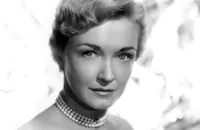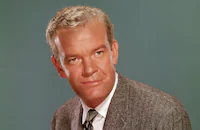Three Brave Men
Brief Synopsis
Cast & Crew
Philip Dunne
Ray Milland
Ernest Borgnine
Frank Lovejoy
Nina Foch
Dean Jagger
Film Details
Technical Specs

Synopsis
In Washington, D.C., John W. Rogers, the Secretary of the Navy, weighs allegations that a long-time Naval Department employee is a member of the Communist Party. Swayed by a pattern of seemingly subversive behavior, Rogers decides to file charges suspending the employee. Soon after, at the Riverview Housing Cooperative outside Washington, Bernie Goldsmith, the employee in question, beams as his daughter Shirley is awarded the Outstanding Citizen's Prize for her essay on patriotism. That night, Perry, who also works at the Naval Department, tells Bernie that he is being investigated as a security risk because in his youth, he briefly joined the Communist Party. Shocked by Perry's naïveté, Bernie defends the government's actions. The next day, Bernie is summoned to his superior's office and summarily suspended. Shaken and humiliated, Bernie returns home and is comforted by his wife Helen. Determined to keep up appearances, Bernie attends a town meeting that night. As Bernie ascends the podium to speak, a man accuses him of being a Communist. The allegation rapidly spreads, and soon the Goldsmith family is receiving harassing phone calls, and Bernie's children, Shirley and Harry, are ostracized by their schoolmates. Concerned, Pastor Browning visits the family and urges them to stand up to their accusers. As Browning accompanies them on a walk through town, the Goldsmiths find that although they are snubbed by some, many people come forth to support them. When Mayor Henry Jensen suggests establishing a legal defense fund, they decide to hire attorney Joe Di Marco to represent Bernie. After Bernie fiercely declares his loyalty to the United States, Di Marco accepts the case for a nominal fee. On the day of Bernie's hearing, Di Marco pleads with Capt. Winfield, Lt. McCoy and the other members of the board to help maintain the good name of the Goldsmith family. He then calls Jensen to the stand, who testifies that those who impugned Bernie's patriotism were his political opponents in the housing cooperative. Jensen explains that Bernie alienated a number of people when, as secretary of the cooperative, he signed a letter notifying the members that they were being forced to buy rather than rent their property. After Lt. McCoy rattles Jensen during her cross-examination, Di Marco asserts that the investigators relied on the testimony of Bernie's enemies. Once the hearing is adjourned for the day, a disheartened Bernie is cheered when Enos Warren, one of his principle opponents in the housing battle, volunteers to testify on his behalf. The next day, Enos affirms that those who spoke to the investigators were bent on blackening Bernie's reputation. When Victoria Scott, the town clerk, voices her support of Bernie and declares that the investigators falsified her testimony against him, Di Marco rests his case. Soon after, a sympathetic McCoy states that the board is dismissing all charges against Bernie. Eagerly anticipating his return to work, Bernie hurries to the office but is refused admittance by the guard and informed that he has not been officially reinstated. Three months later, Bernie, still waiting for his reinstatement, is unable to find employment. To help support his family, Harry, who dreams of attending the Naval Academy, quits high school and takes a job as a janitor. One day, Bernie receives a letter from the government. Thinking that it is his reinstatement papers, Bernie is elated until he reads that he has been fired and that Rogers has decided to reverse the board's recommendation. Rallying behind Bernie, the town plans a press conference to publicize his plight. Influenced by public pressure, Rogers agrees to meet with Bernie and Di Marco. When Rogers refuses to divulge the sources of information against Bernie on the grounds that he is defending the country against Communism, Di Marco angrily accuses him of persecuting an innocent man. His conscience troubled, Rogers reopens the case and after re-interrogating the witnesses, discovers that the charges are groundless. After several of the witnesses recant their testimony and others are discredited, Rogers convenes a new hearing. At a press conference, Rogers publicly apologizes to Bernie, exonerates him of all charges and proclaims that Bernie is a loyal American citizen.

Director
Philip Dunne
Cast

Ray Milland

Ernest Borgnine

Frank Lovejoy

Nina Foch

Dean Jagger
Virginia Christine

Edward Andrews
Frank Faylen

Diane Jergens
Warren Berlinger

Andrew Duggan

Joseph Wiseman

James Westerfield

Richard Anderson

Olive Blakeney

Robert Burton
Jason Wingreen
Ray Montgomery

Sandy Descher
Patty Ann Gerrity
Jonathan Hole
Barbara Gould
Fern Barry
Joseph Mcguinn
Samuel Colt
Robert Haines
Lee Roberts
John Pickard
Ken Scott
Helen Mayon
Selmer Jackson

Walter Reed
Voltaire Perkins
John Close
Lee Graham
Leonard Graves
Keith Vincent
Tom Daly
Gus Lax
Juanita Close
Edith Claire
Roy Glenn
Harry Fleer
Bill Hughes
Tom Dailey
Carleton Young
Joe Bailey
Nico Minardos
Walter Woolf King
Gene O'donnell
Duane Cress
Wilson Wood
Lucille Vance
Crew
Adele Balkan
Chester Bayhi
David Bretherton
Alfred Bruzlin
Charles G. Clarke
Lee Crawford
Doris Drought
Philip Dunne
Paul Fox
Hal Herman
Ray Kellogg
Mark-lee Kirk
Charles Lemaire
Harry M. Leonard
Ben Nye
Irving Rosenberg
Mike Salamunovich
Hans Salter
Walter M. Scott
Leon Shamroy
Mickey Sherrard
Abe Steinberg
Norman Stuart
Herbert B. Swope Jr.
Helen Turpin
Lyle R. Wheeler

Film Details
Technical Specs

Quotes
Trivia
Notes
The working title of this film was The Chasanow Story. The film opens with the following written prologue: "The story you are about to see is based on a series of Pulitzer Prize winning articles by Anthony Lewis. The characters and names of individuals are our own invention, but the story is basically true. It is a story of moral courage shown under great stress by three individuals-and by an institution. That institution, whose shining deeds on behalf of freedom are written indelibly on the pages of history, is the United States Navy." This prologue is followed by a montage of newspaper headlines and newreels dealing with the spread of Communism. Over these images, a voice-over narrator states that "in this atomic age, the Communist Conspiracy is a matter of grave concern to every American... the government is forced to take drastic steps to combat this conspiracy...early in 1953, a new security program was inaugurated, designed to eliminate all possible risks to the national government while fully protecting the rights of the individual...like all new programs, it had to be tested in action....This is the story of one of the earliest cases, a case which had a profound effect on the future administration of the program."
According to a 1957 article in Time, Lewis' articles chronicled the travails of Abraham Chasanow, who in 1954, was falsely charged with disloyalty and discharged from the Navy Department after twenty years of faithful service. After several years of appeals, Chasanow's name was finally cleared. This scandal forced the Navy to re-evaluate its security procedures. Studio publicity in the AMPAS file on the film states that it was not specifically Chasanow's story, but was inspired by it, and was filmed with the full cooperation of the Navy Department. A point is made in the picture that Pastor Browning is substituting for the Goldsmiths' rabbi, who is in the hospital. Although Hollywood Reporter news items place Monty O'Grady, William Hughes, Gary Spencer, Fred Fisher and Harry Baum in the cast, their appearance in the released film has not been confirmed. Another Hollywood Reporter news item lists Philip Terry in the cast, but he did not appear in the picture.

Miscellaneous Notes
Released in United States Winter December 1956
CinemaScope
Released in United States Winter December 1956











